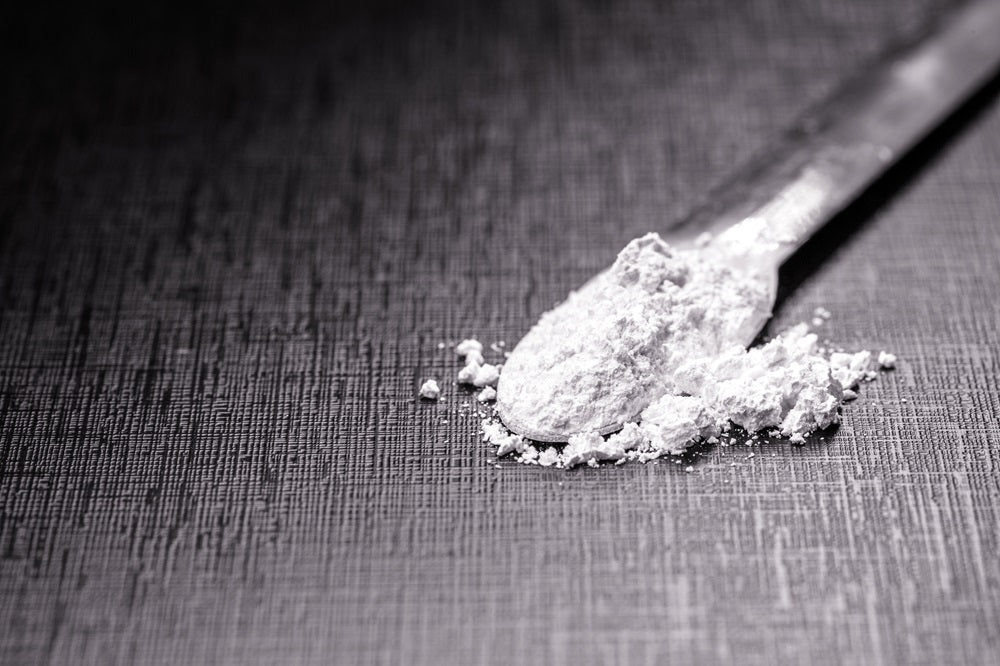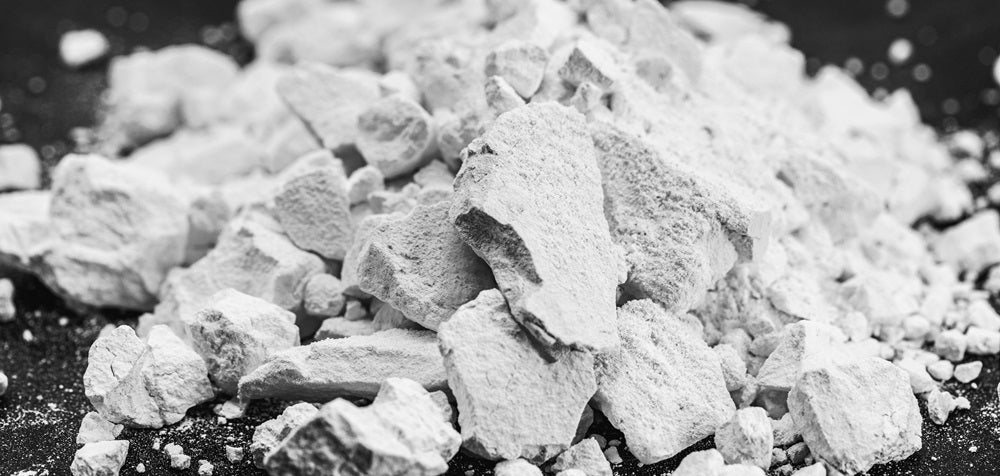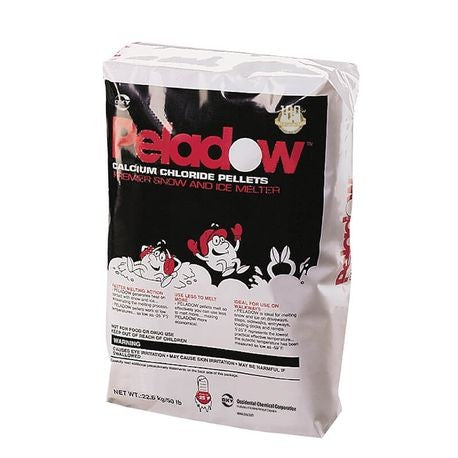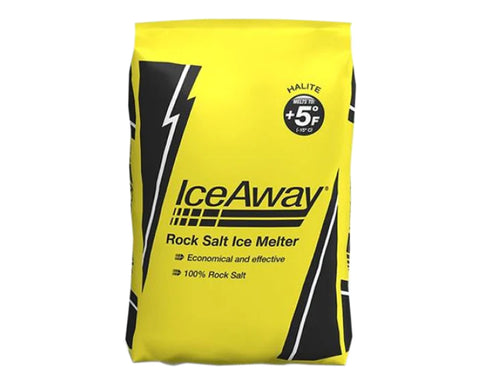
Rock Salt vs Calcium Chloride: Which One Should You Choose?
You need salt for your business — but what kind should you get? In this article, we’ll delve into the differences between calcium chloride ice melt and sodium chloride rock salt. You'll discover that while these two aren’t the same, combining these two chemicals will actually yield superior results.
Let’s explore the effectiveness and benefits of calcium chloride ice melt and rock salt, learning how their strategic blending can help you effectively tackle snow and ice this winter.
What Is Rock Salt?
Rock salt, also known as sodium chloride, is a commonly used substance for melting ice. It is valued for its effectiveness in melting ice and snow on roads, walkways, and driveways, quickly penetrating and breaking down ice formations. With its affordability and wide availability, rock salt is a popular choice for de-icing applications, providing an efficient solution for maintaining safe and ice-free surfaces during winter weather conditions.
What Is Calcium Chloride?

Calcium chloride is a chemical compound composed of calcium and chloride ions. It works by lowering the freezing point of water, making it harder for ice to form. This makes calcium chloride highly effective in melting ice and preventing its formation on surfaces. Moreover, calcium chloride can withstand much lower temperatures compared to other deicing substances, making it an ideal choice for regions that experience extremely cold weather. Its ability to handle frigid conditions makes calcium chloride a valuable tool for ensuring safety on icy surfaces during winter months.

Get Ice-Free Surfaces with Ninja De-Icer
Unleash the ice-busting power of Ninja De-Icer's de-icing products. Try our calcium chloride ice melt today!
Get a QuoteWhat Is the Difference Between Calcium Chloride and Sodium Chloride?
When it comes to ice melting, the key difference between rock salt and calcium chloride lies in their chemical composition and melting capabilities.
Rock Salt Is Much Cheaper than Calcium Chloride
Rock salt is a simple product that is widely available and easy to find. If you're a professional, you can buy it by the pallet or in bulk quantities. As long as you store it correctly, bulk rock salt will last you until you need it. Because it's so abundant, rock salt is the cheapest choice for de-icing.
However, if you're using rock salt when you should be using calcium chloride ice melt, or using too much rock salt altogether, then it's not going to save you any money. It's best if you have both and use them strategically.
Calcium Chloride vs Rock Salt: Which One Works Better?

When comparing rock salt vs calcium chloride for ice melting, it's important to consider effectiveness and temperature considerations. While both are effective in melting ice, calcium chloride has a lower freezing point, making it more effective at extremely low temperatures. It can melt ice at temperatures as low as -25º Fahrenheit, whereas rock salt is less effective below zero. Use the ice melt when a blizzard hits, especially if the temperature is going to dip well below freezing.
Sodium Chloride Is Less Corrosive
Calcium chloride is known to have a higher corrosive potential. It can cause damage to metal surfaces and rusting of vehicles if not used with caution. On the other hand, rock salt is generally considered less corrosive than calcium chloride, but can still be corrosive. It's still advisable to rinse off any accumulated salt residue from vehicles and surfaces after the ice has melted to minimize potential damage.
Calcium Chloride vs Rock Salt: What Is Safer for Landscaping?
While both substances can melt ice effectively, rock salt may pose a higher risk to plants and vegetation. Sodium ions can accumulate in the soil, potentially causing damage to plant roots and impairing their overall health.
Calcium chloride, on the other hand, is generally considered less harmful to plants and may be a better choice for areas where landscape preservation is a concern. Overusing any ice melt product is bad for the environment. Instead of concerning yourself with the “safer” product, focus on only using as much of either product as you need for a job. It'll save you money and the environment all at the same time.
| Calcium Chloride vs. Rock Salt for Ice Melting | ||
|---|---|---|
| Feature | Calcium Chloride Ice Melt | Rock Salt (Sodium Chloride) |
| Usage Recommendation | Highly effective in extremely low temperatures and for quicker melting. | Cost-effective for general use; best when used strategically alongside calcium chloride. |
| Melting Effectiveness | Can melt ice at temperatures as low as -25°F. | Less effective at temperatures below freezing. |
| Corrosiveness | Known for higher corrosive potential, especially for metals. | Generally less corrosive than calcium chloride. |
| Safety for Landscaping | Less harmful to plants; better for areas where vegetation is a concern. | Can accumulate in soil and harm plant roots, posing higher risk to vegetation. |
What About Mixing Calcium Chloride and Rock Salt?
Calcium chloride and rock salt are not the same, but mixing them together can be an effective approach to ice melting. Combining these de-icers can provide enhanced melting power and prevent further ice bonding. By using both calcium chloride and rock salt together, any snow or ice that falls will have a better chance of melting properly, ensuring safer surfaces.
Premier Rock Salt and Calcium Chloride Products
Discover the melting power and effectiveness of these high-quality products as we explore their features and benefits.
Calcium Chloride Ice Melts
- Thunder Melt Ice Melter: This is a premium professional ice melt that combines sodium and calcium chlorides for rapid melting. With its violet tint, it offers excellent application visibility on snow and ice. This high-quality formula outperforms regular rock salt, activating faster and melting at cold temperatures as low as -16ºF.
- Peladow: Peladow calcium chloride ice melt pellets are a top choice for sidewalks and driveways. These pellets are designed to melt ice up to 3 times faster than other products, delivering excellent performance even in a wide range of temperatures. With a chemical composition consisting solely of calcium chloride, Peladow pellets are highly effective down to -25°F. Their unique design allows them to penetrate ice and snow quickly, providing efficient melting power with only a small portion of each pellet in contact with the surface.
- DOWFLAKE EXTRA: This ice melt offers exceptional performance and power in combating dust, ice, and snow. With 10% more calcium chloride than regular flakes, it delivers excellent pound-for-pound performance. Its composition of 83-87% calcium chloride ensures potent melting capabilities. DOWFLAKE Xtra works effectively across a wide range of temperatures and can be used on various surfaces, from roads to sidewalks. This white-colored ice melt is a reliable choice for efficient winter maintenance in diverse settings.
Sodium Chloride/Rock Salt
- Ice Away Rock Salt: It is a reliable choice for ice melting needs, especially in parking lot applications. Its chunky halite crystals are specially sized for maximum melting efficiency and easy spreading. With a chemical composition of sodium chloride, this white-colored ice melt is effective down to 5°F. The medium-sized crystals offer a unique combination of ice and snow melting capabilities along with the traction provided by larger particles, ensuring effective ice removal and improved traction on slippery surfaces.
- Halite Rock Salt: This is a specially engineered ice melt product designed for efficient ice melting, particularly in parking lot applications. With a unique blend of small and large sodium chloride crystals, treated with an anti-caking agent, Halite offers effective and reliable ice melting capabilities. The small crystals ensure fast melting, while the larger crystals provide long-lasting ice protection. With a chemical composition of sodium chloride, Halite Rock Salt is highly effective down to 5°F, making it a dependable choice for winter maintenance.
- Morton® Safe-T-Salt®: This rock salt is the ideal solution for keeping walkways, driveways, and parking lots ice-free. Available in convenient 50lb bags, it can be purchased in various quantities, from a pallet of 49 bags to a full truckload of 18 pallets. With its sodium chloride composition, this white-colored ice melt is effective down to 5°F, providing swift snow and ice melting action while preventing slippery surfaces. Ensure clear and safe pathways with Morton® Safe-T-Salt® Ice Melt rock salt.
Discover the Benefits of Rock Salt and Calcium Chloride with Ninja De-Icer!
Now that you know the difference between rock salt and calcium chloride, the best conclusion to draw is that each ice and snow management product has its benefits and drawbacks, and should be used for different situations. As a reputable provider of top-notch ice melts, Ninja De-Icer offers high-quality rock salt and calcium chloride solutions. Contact us today to get a quote and experience the outstanding performance of our products in conquering icy conditions.





